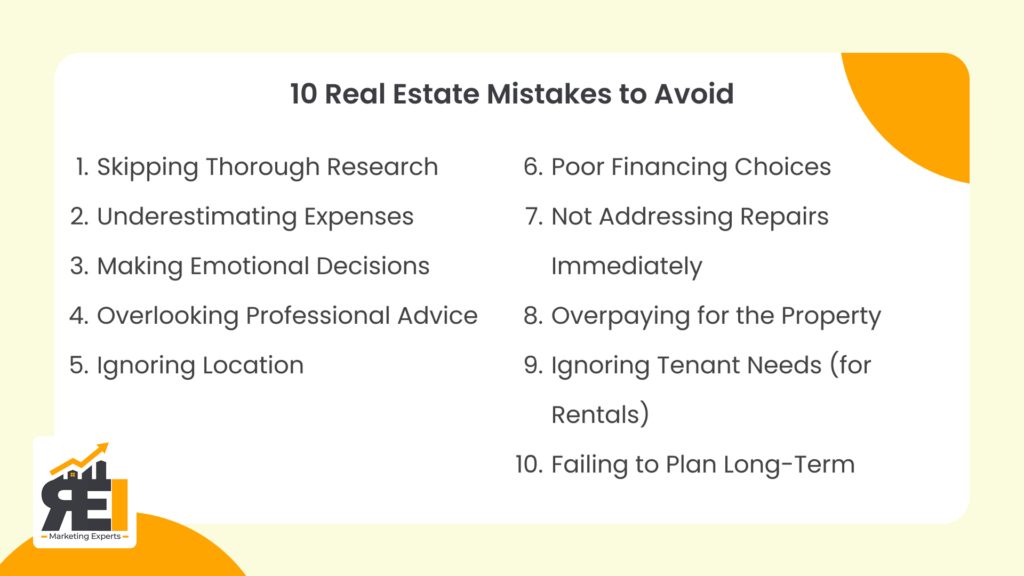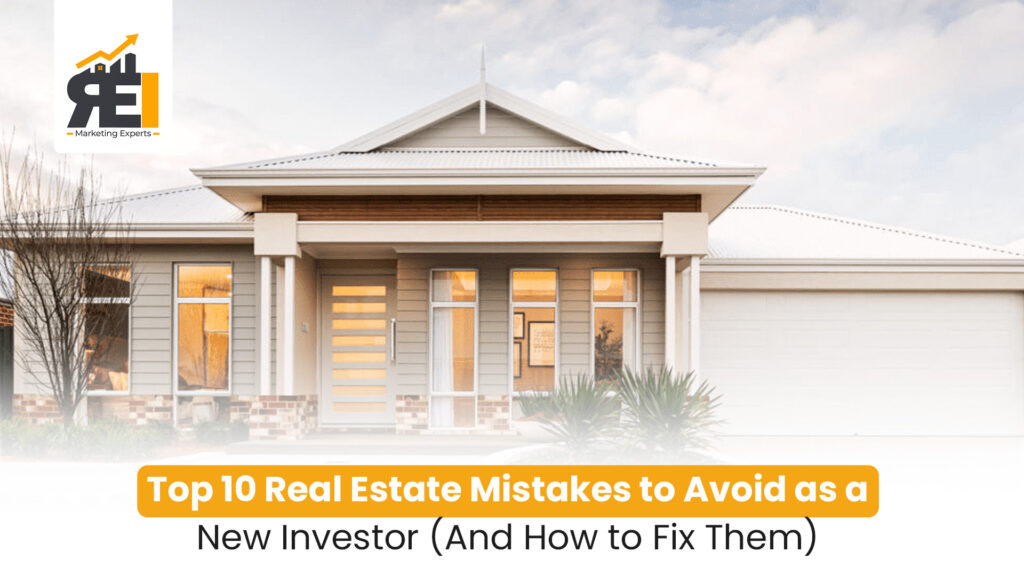Avoid These Common Real Estate Mistakes
Navigating the real estate market can be both exciting and overwhelming—especially for new investors. Whether you’re buying your first rental, flipping a property, or diving into wholesaling, it’s easy to make real estate mistakes to avoid that cost time, money, or opportunity.
In this guide, we’ll break down the top real estate mistakes to avoid and how to protect your investment every step of the way. From research to repair budgets, avoiding these pitfalls can save you thousands and keep your deals on track.
10 Real Estate Mistakes to Avoid

1. Skipping Thorough Research
One of the most common real estate mistakes is diving into a deal without fully understanding the market. Many beginners focus only on price—but that’s just the tip of the iceberg.
🔍 Why this matters:
- Every neighborhood has its own price trends, tenant demographics, and appreciation potential.
- A lack of due diligence can leave you with a bad location, hidden property issues, or poor resale value.
✅ Fix it:
Spend time analyzing local comps, checking zoning laws, reviewing historical trends, and inspecting the property’s past. Use tools like PropStream or local MLS data.
2. Underestimating Expenses
New investors often focus only on the purchase price and forget the long-term costs involved in owning or flipping a property.
💸 Common overlooked costs:
- Property taxes
- Insurance premiums
- Maintenance and repairs
- Utility bills
- Closing and holding costs
✅ Fix it:
Create a complete budget using conservative estimates. Always add a 10–15% buffer for unexpected costs.
3. Making Emotional Decisions
Buying a home or rental property based on feelings—rather than facts—is one of the top real estate mistakes to avoid.
❗️Example:
Falling in love with a beautifully staged house but ignoring that it’s overpriced and sits in a stagnant market.
✅ Fix it:
Let the numbers do the talking. Cap rate, cash flow, ROI, and ARV should guide your decisions—not how the kitchen makes you feel.
4. Overlooking Professional Advice
Trying to go it alone may seem like a money-saving move, but it usually costs more in the long run.
💼 Why professionals matter:
- Real estate agents know negotiation tactics and local trends.
- Home inspectors uncover costly hidden problems.
- Financial advisors help structure smart investment plans.
✅ Fix it:
Build a power team early—agent, lender, contractor, inspector, and title company. Their guidance can make or break your deal.
5. Ignoring Location
You’ve heard it before—location is everything. But many new investors still prioritize features over location potential.
📍What to consider:
- Proximity to schools, jobs, and transportation
- Local crime rates
- Upcoming development projects
- Historical property value trends
✅ Fix it:
Use tools like NeighborhoodScout or local city planning documents to analyze area potential before buying.
6. Poor Financing Choices
Bad financing is one of the costliest real estate mistakes. Adjustable-rate mortgages, high-interest hard money loans, or not getting pre-approved can derail your plans.
✅ Fix it:
- Get pre-approved before property hunting.
- Understand your loan terms clearly.
- Choose financing that matches your investment strategy (fix & flip vs. buy & hold).
7. Not Addressing Repairs Immediately
Delaying necessary repairs can turn small issues into big expenses—and even impact your ability to rent or sell.
✅ Fix it:
- Get a professional inspection before buying.
- Prioritize health and safety repairs first.
- Set aside a CapEx (capital expenditures) fund for future upgrades.
8. Overpaying for the Property
In hot markets, it’s easy to get caught in bidding wars or overestimate a property’s value.
❌ Consequences:
- Lower returns on investment
- Cash flow problems
- Difficulty selling in the future
✅ Fix it:
- Always run comps.
- Consider getting a professional appraisal.
- Stick to your budget—even if it means walking away.
9. Ignoring Tenant Needs (for Rentals)
If you’re investing in rental properties, your success depends on tenant satisfaction. Many new investors don’t factor this in.
👎 Common mistakes:
- Poor-quality finishes
- Lack of amenities
- Ignoring tenant feedback
- Violating local landlord-tenant laws
✅ Fix it:
- Study your tenant demographic.
- Provide clean, safe, functional housing.
- Stay compliant with all local rental regulations.
10. Failing to Plan Long-Term
Without a strategy, real estate becomes guesswork. Too many investors jump from one property to another without a clear direction.
🎯 Common consequences:
- Burnout
- Overextension
- Missed opportunities
✅ Fix it:
Create a written investment plan. Define your goals (cash flow, appreciation, tax benefits), budget, target markets, and timeline.
Is Investment in Real Estate Worth It in 2025?
Absolutely—if done right. While the market in 2025 is competitive and evolving, real estate remains a powerful vehicle for building long-term wealth. By avoiding these real estate mistakes to avoid, you position yourself to succeed where others fail.
Conclusion:
Every real estate investor makes mistakes—but the smart ones learn from them. By focusing on research, budgeting, professional advice, and long-term strategy, you can build a portfolio that stands the test of time. Avoiding the top real estate mistakes could be the difference between a costly lesson and a profitable success story.
At REI Marketing Experts, we help investors avoid these pitfalls with proven lead generation and digital strategies tailored for 2025.
FAQs
Q1: What to avoid when investing in real estate?
Answer: Avoid rushing into deals without research, underestimating costs, ignoring expert advice, making emotional decisions, and failing to plan your long-term strategy.
Q2: What is the biggest mistake real estate agents make?
Answer: One major mistake agents make is overpromising to clients or mispricing homes—either of which can delay deals and damage reputation.
Q3: How do I avoid losing money in real estate?
Answer: Stick to your budget, avoid overpaying, analyze deals thoroughly, and always plan for unexpected costs. Work with professionals and invest in education.
Q4: Is it a bad time to invest in real estate in 2025?
Answer: No, but success depends on smart strategy. With proper due diligence, financing, and a solid investment plan, 2025 can offer strong returns—especially in emerging markets.
Q5: What is the most important thing in real estate investing?
Answer: Due diligence. Knowing the numbers, understanding the location, and aligning with your goals is what separates winning investors from the rest.

